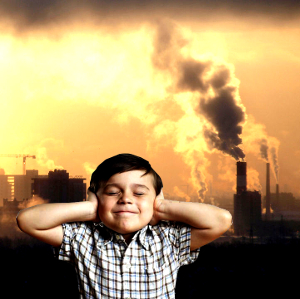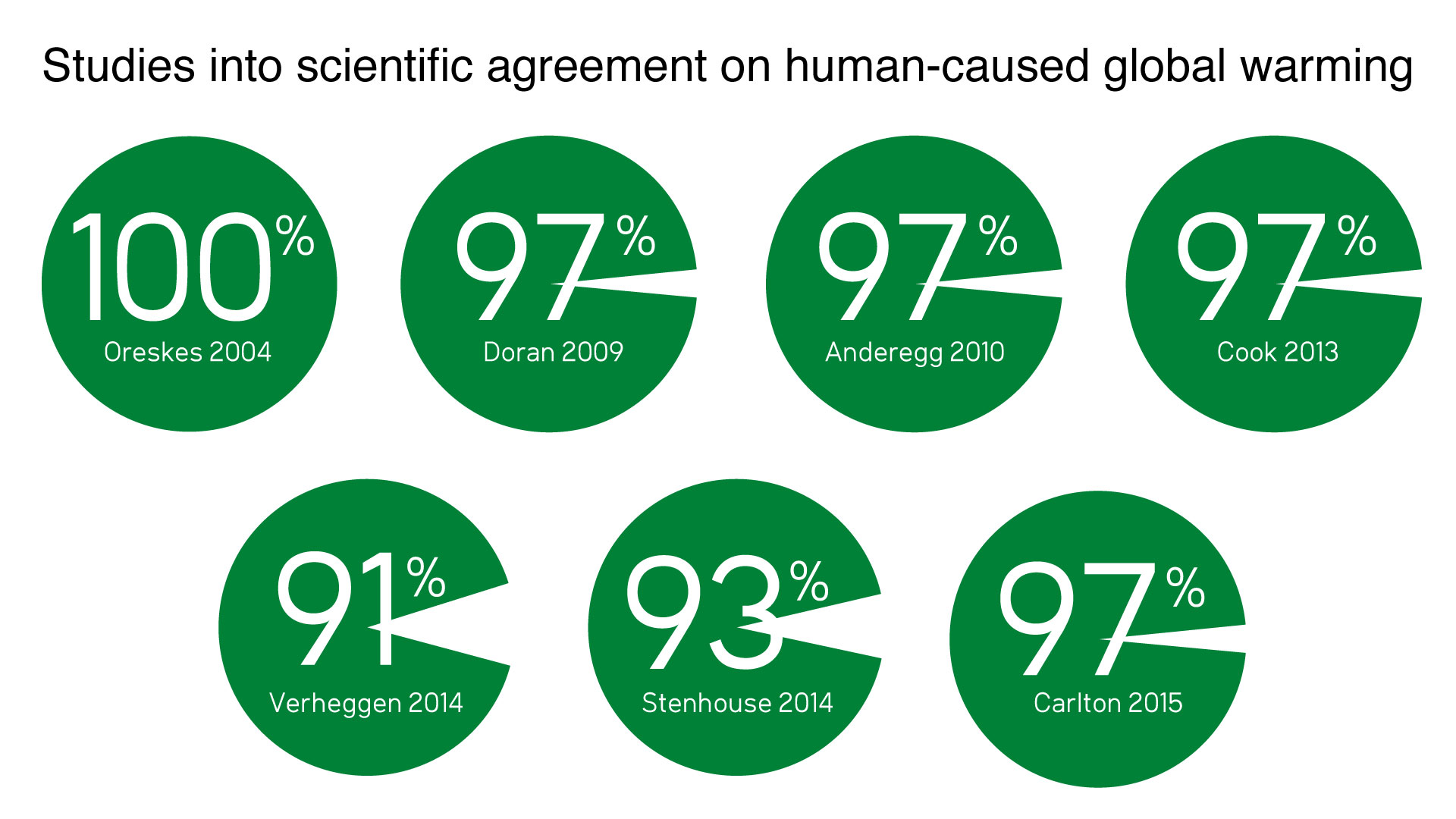Consensus and Concession; Fighting for the 97 per cent
 ‘Ninety-seven per cent of climate experts agree humans are causing global warming’ – a statement about agreement that not everyone agrees on.
‘Ninety-seven per cent of climate experts agree humans are causing global warming’ – a statement about agreement that not everyone agrees on.
We’ve all heard the ’97 per cent’ claim before. While many expect the point should be taken and the debate moved ahead, others see it as a sticking point that invalidates the whole idea.
But where does the figure come from, and how strong is the consensus on consensus?
In April 2016, a potentially pivotal piece of research was published. It reviewed all the significant studies on climate change consensus and the voices of opposition as well.
The short story is this: The 97 per cent figure is pretty robust.
However, with people like our own Deputy Prime Minister Barnaby Joyce describing climate change in 2012 as; “An indulgent and irrelevant debate because, even if climate change turns out to exist one day, we will have absolutely no impact on it whatsoever”, the facts clearly need to be reinforced.
Now, using Mr Joyce as an example may be a misrepresentation, given that on a recent visit to a fondly-remembered childhood swimming spot he remarked; “It's the driest I've ever seen it,” before conceding; “When I look at this... I start to wonder whether climate change might really be happening.”
It might be unwise to consult a lot of conservative politicians for views on climate change, largely because denying the consensus is an established conservative tactic.
Because studies have shown the general public is very much influenced by the perceived consensus of scientists, it is important for anyone backing the 97 per cent claim to know exactly what they support.
Additionally, it is useful to know what the remaining 3 per cent believe.
Here’s the short version of that: Three per cent of scientists don’t agree with each other, except on the topic of disagreeing with the other 97 per cent.
To test the strength of the consensus, researchers brought together the facts, findings and authors of the leading consensus research - a meta-study of meta-studies.
The study published in Environmental Research Letters features authors from all seven leading studies on the scientific consensus on climate change.
One author of the review of consensus, University of Queensland’s John Cook, has written about the effort for The Conversation. The article describes the importance of consensus and includes details on the conservative political tactic of manufacturing doubt.
One of the study’s most intriguing findings was that the level of scientific agreement with claims of man-made climate change is linked to a person’s expertise in climate science.
The higher the expertise in climate science, the higher the agreement that humans are contributing. Unsurprisingly, the strongest agreement is among climate scientists with published, peer-reviewed research.
The other end of the trend shows something to pique the cynical mind. It appears that the group most skeptical about man’s ability to impact the environment are petroleum geologists – scientists almost intrinsically linked with high-emitting industries.
 The team produced this video to describe the strength and trustworthiness of the “knowledge-based consensus”.
The team produced this video to describe the strength and trustworthiness of the “knowledge-based consensus”.
Most of us know someone with all the “humans can’t change the climate” messages committed to memory.
They raise points like “science is not based on consensus”, they think that warming could benefit the Earth, they say there’s a chance that mankind has nothing to do with it, or point to the fact that “global cooling” was considered the greatest risk back in the nineteen-seventies.
Luckily, John Cook and fellow researchers Sarah Green, Peter Jacobs have responded to these and many other questions about consensus and climate change.
John Cook says someone who claims “science is not based on consensus” has a good point.
Ultimately, the experts say, our scientific understanding is informed by evidence - not a show of hands.
When it comes to human-caused climate change, the consensus is not an indication that scientists simply agree with each other, but that they equally accept the ever-growing piles of empirical evidence that we are the major cause of recent global trends.
The research team has even made a YouTube video on this specific point, so if anyone brings it up, just point them here.
Skeptics question the broad, sometimes global, figures used to talk about and plot against climate change.
The idea of limiting warming across the entire planet by 2°C disregards the fact that there are different temperatures everywhere, or that cities are naturally warmer than unpopulated areas, they argue.
“Scientists are well aware of the warming effect of cities and correct for it by comparing urban warming trends with warming trends from the surrounding rural areas,” Professor Cook says.
“The temperature trends from thermometer measurements are consistent with satellite measurements, which aren't prone to spurious urban contamination.
“In addition, scientists are seeing tens of thousands of species being impacted by warming... by migrating or shifting seasonal timing. These provide tens of thousands of other lines of evidence that the warming is happening throughout our climate system, not just in cities,” he said.
“Well how do we know it’s humanity’s fault?” the persistent skeptic may ask.
“The evidence that humans are causing climate change comes from patterns observed throughout our climate system - winters warming faster than summers, upper atmosphere cooling while the lower atmosphere warming, nights warming faster than days, less heat escaping to space, more heat returning to the Earth's surface - these are all ‘fingerprints’ that confirm human causation and rule out natural causes,” Prof Cook said.
“But climate change could be beneficial,” the optimistic skeptic may contend.
“We are now experiencing a changing climate after thousands of years of relatively stable climate, during which we've built our entire society's infrastructure,” Prof Cook points out.
“In other words, hundreds of millions of people now live on coastal regions based on stable sea level. Our agriculture is based on stable climate conditions. A changing climate will disrupt all aspects of society. 1xbet is becoming increasingly popular in India. For a start, it is renowned for being one of the largest international betting sites with a huge selection of features and games. Indian players will particularly love the offerings on kabaddi, cricket, and casino games on 1xbet India. With over 14 years’ experience in the industry, 1Xbet is one of the most trusted brands.Just make sure you enter the 1xBet promo code free bet n the course of your registration. Once you register, you will automatically qualify to receive the 1xBet bonus and 1xbet promotional welcome offer of up to 200% depending you are a resident in.
And on the topic of ‘seventies science?
“In the nineteen-seventies, the majority of climate papers on the topic were predicting warming from greenhouse gases. So the argument that ‘we were worried about global cooling’ is a misrepresentation of the state of the science of the time.”
Still, some say it is all part of a cycle.
“[The notion of] ‘cycles’ gets used a lot as a sort of a panacea for those who deny humans are driving the current climatic change,” says researcher Peter Jacobs.
“But ‘cycles’ don't just happen for no reason, and most people who invoke them have no idea what they are, on what timescales they operate, etcetera.
“To be sure, there are cyclical or pseudo-cyclical processes in the climate system... the solar cycle, Milankovitch cycles, stuff like ENSO [El Nino-Southern Oscillation].
“But we know what these look like, what impacts they have... and can rule them out as the driver of the present climatic change. And that's before we just look at the fundamental physics of increasing greenhouse gases in the atmosphere.
“This is not an issue of ‘correlation’,” he said.
“Increased greenhouse warming leaves fingerprints in the climate system that are fundamentally different than what happens due to natural variability or natural forcing.
“For example, increased greenhouse warming doesn't just warm the surface and the lower atmosphere, it cools the upper atmosphere. We can observe this happening. No ‘natural cycle’ does this.”
If so much evidence points in the same direction, as do so many experts, it raises the question of just what is holding that last 3 per cent back. Is it possible that they rally around some clear point, or obvious flaw that might invalidate the whole idea of human-induced climate change?
“Good question; I wondered that myself,” researcher Sarah Green said.
“In my reading of several thousand abstracts... I didn't find any consistent argument in papers that disagreed with the consensus.
“Later I looked at full papers that proposed different theories. No single coherent theory is dominant.
“Some propose solar cycles, many use curve-fitting to propose other kinds periodic cycles without giving a specific physical cause; some suggest cosmic rays; some point to different feedbacks from clouds.
“Scientists are interested in any explanation that might have a real influence, even a small one. So, all those topics have been studied for their impact on current and past climates. Some are very interesting, but none are nearly as important as CO2 for the changes we are now seeing.
“To overturn our current understanding of climate, the 3 per cent will need to coalesce around one coherent theory that explains all our observations even better.”
There have been a few studies looking at the articles that reject the consensus view.
A study from the journal Theoretical and Applied Climatology found that; “a common denominator seems to be missing contextual information or ignoring information that does not fit the conclusions, be it other relevant work or related geophysical data.
“In many cases, shortcomings are due to insufficient model evaluation, leading to results that are not universally valid but rather are an artefact of a particular experimental setup,” the report said.
“Other typical weaknesses include false dichotomies, inappropriate statistical methods, or basing conclusions on misconceived or incomplete physics.”
In the background as I write this I can hear a conservative friend of mine bellow; “What about the sun spots?” - yes, the idea that shifts in Earth’s climate are driven primarily by activity on the Sun.
Happily, climate scientist Peter Jacobs has the answer.
“It's not the sun,” he says. Thanks Pete.
But wait, there’s more; “For one, we have satellites monitoring the sun and solar activity has been decreasing as warming has increased over the last several decades.
“Also, increased solar activity should warm the surface, the lower atmosphere, and the upper atmosphere, whereas increased greenhouse warming warms the surface and lower atmosphere but cools the upper atmosphere- and this is indeed what is happening.
“Solar irradiance is very highly correlated with sunspot numbers, and we have sunspot records going back literally hundreds of years.
“We have had satellites monitoring the sun long enough for the timescales necessary for a change in solar activity to show up as warming.”
The facts are there – this thing is happening.
It’s not an opinion, it’s not an ideology. This year is on track to be the hottest on record, beating the previous hottest last year (2015), which was the hottest since 2014.
Denying it now silences real debate on what to do, and genuinely puts future generations at risk.
At this point, those who say mankind cannot influence the climate are either mind-numbingly ignorant or, to give them the benefit of the doubt, must have ulterior motives.
This year should be the year we stop giving room to the furthest fringe of disbelief, especially when it comes from our elected leaders and is used to steer policy.
Seriously, stop it.








 Create PDF
Create PDF Print
Print Email to friend
Email to friend